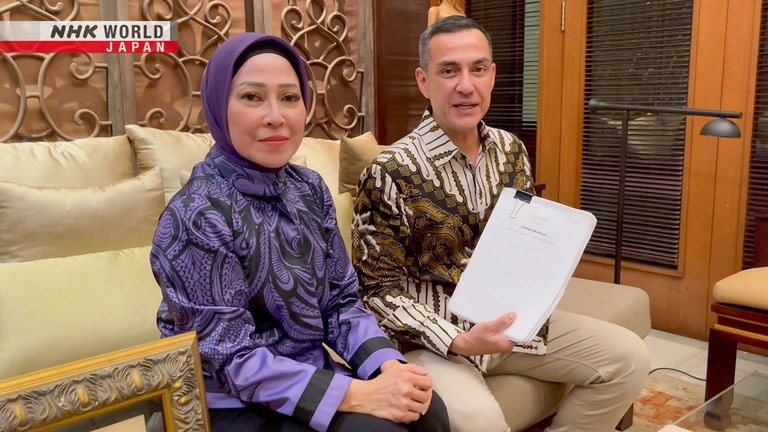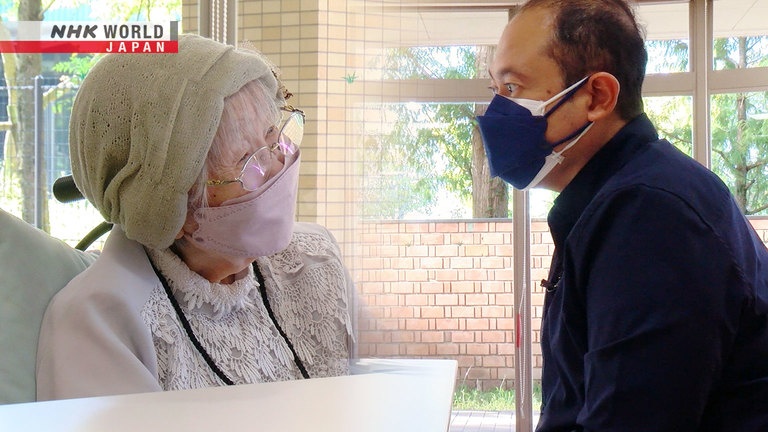Southeast Asian Memories of Hiroshima
NHK WORLD-JAPAN Indonesian language reporter Aji Rokhadi retraces the stories of Southeast Asian youths who had been sent to study in Hiroshima when the atomic bomb fell. He speaks with two Indonesian siblings whose father was a survivor of the tragedy and a Japanese woman who spent time with him after the bombing.



Transcript
Hiroshima, in western Japan.
Looking at this peaceful view, it's hard to imagine that seventy-seven years ago, the city was destroyed by an atomic bomb.
My name is Aji Rokhadi.
I'm an Indonesian language reporter for NHK WORLD-JAPAN.
I've learned that some students from Southeast Asia, including from Indonesia, just like myself, fell victim to the atomic bombing that happened in 1945 here in Hiroshima.
As conflicts continue to rage around the world even today, I felt that there must be something that we can learn from the experience of those students.
And so, I set out to hear their stories.
How did Southeast Asian students become victims of the bombing on Hiroshima?
In my research, I became acquainted with two siblings whose father was one of the survivors.
Deden Rochmawaty and Ferdy Hasan live in Jakarta.
Our parents told us that
our father was a survivor...
of the Hiroshima atomic bomb.
Their father, Hasan Rahaya, was in his early twenties during imperial Japan's occupation of Indonesia.
Japanese soldiers often came
to our grandmother's shop...
where our father helped out.
He learned Japanese,
and the soldiers took a liking to him.
As Hasan could speak Japanese, he was chosen to come study in Japan.
Records indicate that Hasan entered university in Hiroshima in April 1945.
He told his family that he had been attending a lecture when the bomb fell.
As the building collapsed, he made his narrow escape.
When we were kids, our father said
he had to jump into the river...
to escape from the heat of the blast.
Looking to find out more, I visited the Memorial Museum in Hiroshima.
Along with Hasan Rahaya, there were eight other students from Southeast Asia in Hiroshima at the time.
They were officially called Special Foreign Students from Southeast Asia.
Students came to Japan,
shouldering the future of Java.
During the second world war, the Japanese government called in youths from the Southeast Asian territories under its occupation to train as future leaders in their respective regions.
205 participants came to Japan in 1943 and the following year.
Present in Hiroshima in 1945 were students from what are now Malaysia, Indonesia and Brunei.
The Japanese lessons
were said to be very strict.
If students spoke in their native tongue,
it's said they were severely punished.
Some of the letters the students sent to a Japanese friend have been preserved.
They were written by students from what were then Malaya and North Borneo after the Hiroshima bombing.
"Dear Meiko, how have you been?"
"I fondly miss our university in Hiroshima."
The letters' recipient was Takahashi Meiko, a Japanese woman of about the same age as the students.
I had the chance to meet her.
Now aged 96, she goes by the married surname of Kurihara.
How did you feel when
you received the letters?
I was very happy and moved to realize
how they had been worried about me.
Meiko too was a student when the bomb fell.
Japanese students during the war were assigned to work in places like armaments factories.
It felt like a bomb fell
directly on our factory.
The windows shattered
and the roof was blown off.
Her house was burnt down and her father went missing.
As she looked for him through the ruins, she stumbled upon the foreign students at a university.
She, along with Hasan Rahaya and six other Southeast Asian students spent a week sleeping on the university grounds.
Every day, as she came back empty-handed from her search for her father, the students welcomed her.
They were so kind to me.
I told them, 'You've done nothing wrong.' 'Don't you hate Japan for putting you
in such a horrible situation?'
They answered, 'Not at all.' 'We're all human.
We must help one another.'
They said, 'Let's do our best
to get along.' On August fourteenth, Meiko and the Southeast Asian students parted ways.
The following day, Japan declared its surrender.
In 2013, sixty-eight years after the war...
...at a ceremony in Jakarta, Hasan Rahaya was given an honorary doctorate from Hiroshima University, as he hadn't been able to complete his studies during his time there.
After leaving Hiroshima, he studied at a university in Tokyo.
He then returned to his homeland where he went on to become a member of parliament.
After the ceremony, he spoke about Meiko.
She's still alive today.
We're about the same age.
I'd love to meet her
and reminisce about that time.
Although he'd been looking forward to it, his wish did not come true.
In 2014, Hasan passed away at the age of 92.
Since then, Ferdy and Deden have been thinking of compiling their father's written recollections of his experience in a book.
They decided to speak with Meiko who had been with their father right after the bombing.
I took part in their meeting.
Good morning, Mrs. Kurihara.
Hello, my name is Ferdy Hasan.
I'm the second child of Hasan Rahaya.
It was told by my father that you had
joined the Indonesian students for days.
We slept on the ground, so your father
kept asking me if I was feeling cold.
He was so kind to me.
It made me happy.
Meiko clearly remembers the time she spent with Hasan Rahaya and the other students.
We sang together.
They showed me some photos.
It was a pleasant time.
Nearby, bodies were piled up
and being burned.
They gave off a strange smell,
like burning fish.
It was a horrible situation,
but we tried to forget about it...
and did our best to have fun.
I'm so thankful for
the Southeast Asian students.
They were a source of encouragement.
Thank you so much for having been
part of our father's life.
Thanks to you, he could have
a happy memory in spite of the tragedy.
Through hearing those stories, I could feel that, no matter the circumstances, people can always connect and support one another.
I'm absolutely opposed to war.
Peace is what's most important.
I sincerely hope the war that's
going on now will end soon.
We all have only one life to live.
We must treasure it.
That is my strongest wish.